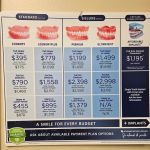How to Handle Dental Fear and Anxiety During Appointments: A Comprehensive Guide
- Understanding Dental Fear and Anxiety
- Common Reasons for Dental Anxiety
- Effective Strategies to Manage Dental Fear
- How to Prepare for Your Dental Visit
- Real-Life Experiences and Case Studies
- Seeking Professional Help for Dental Anxiety
- Visit Dentistry Toothtruth for Expert Advice
For many people, dental visits can be a source of fear and anxiety. Whether it’s the sound of the drill, the fear of pain, or past traumatic experiences, dental anxiety is a common issue that prevents many from seeking regular dental care. However, overcoming this fear is possible with the right approach and techniques. In this article, we’ll explore how to handle dental fear and anxiety during appointments, discuss common triggers, and provide practical tips to help you stay calm and relaxed during your visit.
1. Understanding Dental Fear and Anxiety
Dental fear and anxiety are psychological reactions that can cause physical and emotional distress when thinking about or undergoing dental procedures. It's important to recognize that this fear is not only common but also manageable. Understanding the root causes of your anxiety can help you address it effectively. For some, it’s the anticipation of pain, while for others, it may stem from a past negative experience at the dentist’s office.
1.1. The Psychological Impact of Dental Anxiety
Dental anxiety can be so overwhelming that it leads to avoidance of dental care altogether. This, in turn, can result in further oral health problems. The fear can manifest physically in the form of sweating, rapid heartbeat, or even fainting, which only exacerbates the situation. Recognizing these reactions as a normal response to stress can be the first step toward addressing them.
2. Common Reasons for Dental Anxiety
Understanding the causes of dental fear can provide insight into how to overcome it. Some of the most common reasons people experience dental anxiety include:
2.1. Fear of Pain
Many people are afraid of the pain associated with dental procedures, especially if they have had a previous experience that involved discomfort or pain. Fortunately, advancements in dental technology and anesthesia techniques have made procedures much more comfortable. If you're concerned about pain, be sure to communicate this with your dentist so they can take extra precautions.
2.2. Negative Past Experiences
If you’ve had a traumatic or uncomfortable experience during a past dental visit, it can lead to long-term fear and anxiety. However, understanding that dental care has evolved over time and communicating your concerns with your dentist can help you overcome this fear.
2.3. Fear of Loss of Control
Some people fear dental visits because they feel they have no control over the situation. The dental chair and instruments can evoke a sense of vulnerability. Knowing that you can ask for breaks or clarify what’s happening during the procedure can alleviate this sense of helplessness.
2.4. Fear of the Unknown
For those who have never had a dental procedure or haven’t been to the dentist in a while, fear of the unknown can be a major factor. Not knowing what to expect during an appointment can cause anxiety. Asking your dentist for a step-by-step explanation of what will happen can provide a sense of security.
3. Effective Strategies to Manage Dental Fear
There are several strategies that can help you manage dental fear and anxiety before and during your appointment:
3.1. Deep Breathing and Relaxation Techniques
Before your appointment, take a few minutes to practice deep breathing or mindfulness exercises. Breathing deeply and focusing on calm thoughts can help lower your stress levels and prepare you for your visit. Many people find it helpful to focus on their breathing during the procedure to maintain a sense of control and calm.
3.2. Distraction Techniques
Bringing headphones and listening to calming music or an audiobook can provide a welcome distraction during the procedure. Some dental offices also offer TV screens or video goggles to help keep your mind engaged while the dentist works.
3.3. Speak Up About Your Anxiety
Don't be afraid to communicate with your dentist about your anxiety. A good dentist will be understanding and will do their best to make you feel comfortable. They may offer sedation options or allow for more frequent breaks to help you manage your fear.
3.4. Consider Sedation Dentistry
If your dental anxiety is severe, sedation dentistry may be a viable option. Sedation can range from mild relaxation techniques to full general anesthesia, depending on your level of anxiety and the procedure being performed. Talk to your dentist about sedation options to find the best solution for your needs.
4. How to Prepare for Your Dental Visit
Proper preparation can help ease your anxiety on the day of your dental appointment. Here are some steps to consider before your visit:
4.1. Arrive Early
Arriving a little early can give you time to settle in and relax before the procedure begins. Use this time to complete any necessary paperwork and talk to the staff about your concerns.
4.2. Bring a Support Person
If you feel comfortable, bring a friend or family member with you for emotional support. Having someone familiar there can provide reassurance and help you feel more at ease.
4.3. Plan Your Day
Try not to schedule other stressful tasks on the same day as your dental appointment. Having a relaxing day before and after the visit can help minimize anxiety and make your appointment feel like a manageable part of your day.
5. Real-Life Experiences and Case Studies
Many people who experience dental fear can eventually overcome it with the right strategies. One patient shared that after experiencing intense fear of dental procedures for years, they started using deep breathing techniques and sedation dentistry, which significantly reduced their anxiety and allowed them to get the care they needed. Their experience shows that with the right approach, dental fear can be managed effectively.
6. Seeking Professional Help for Dental Anxiety
If your dental anxiety is severe or persistent, seeking professional help from a therapist or counselor who specializes in anxiety management can be beneficial. Cognitive behavioral therapy (CBT) has been shown to be effective in addressing dental anxiety by helping patients reframe their thoughts and manage their fears.
7. Visit Dentistry Toothtruth for Expert Advice
If you’re looking for more personalized advice on how to handle dental fear and anxiety, visit Dentistry Toothtruth. Their team of professionals is dedicated to helping patients feel comfortable and relaxed during dental visits. They offer practical solutions, expert tips, and resources to help you manage dental anxiety and ensure your oral health is always a priority.
Don’t let dental fear keep you from getting the care you need. Learn more about effective strategies and take control of your dental health today!







 Dr. Robert S. King, DDS5.0 (3 review)
Dr. Robert S. King, DDS5.0 (3 review) ADVANCED SMILES PC4.0 (205 review)
ADVANCED SMILES PC4.0 (205 review) Surprise Endodontics4.0 (170 review)
Surprise Endodontics4.0 (170 review) Eden Dental, PC5.0 (1 review)
Eden Dental, PC5.0 (1 review) Canton Kids Dentistry: Dr. Farshid Nia5.0 (2 review)
Canton Kids Dentistry: Dr. Farshid Nia5.0 (2 review) Affordable Dentures & Implants4.0 (757 review)
Affordable Dentures & Implants4.0 (757 review) The Importance of Oral Health Education During Pregnancy for a Healthy Pregnancy
The Importance of Oral Health Education During Pregnancy for a Healthy Pregnancy Best Tips for Brushing Your Teeth Properly for Healthy Gums: Essential Techniques for Oral Health
Best Tips for Brushing Your Teeth Properly for Healthy Gums: Essential Techniques for Oral Health Why Skipping Dental Checkups Can Lead to Bigger Oral Health Problems
Why Skipping Dental Checkups Can Lead to Bigger Oral Health Problems Advantages of Porcelain Dental Restorations
Advantages of Porcelain Dental Restorations How Can Diabetes Cause Tooth and Gum Problems? Preventing and Managing Oral Health Issues
How Can Diabetes Cause Tooth and Gum Problems? Preventing and Managing Oral Health Issues Healthy Habits for Promoting Good Oral Health and Hygiene: Tips for a Healthy Smile
Healthy Habits for Promoting Good Oral Health and Hygiene: Tips for a Healthy Smile